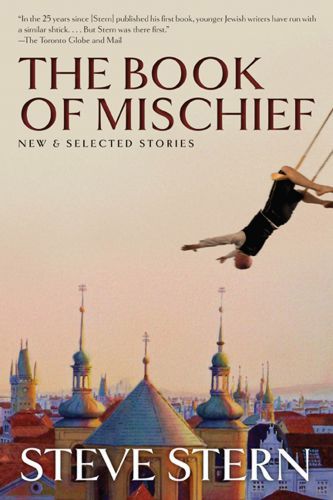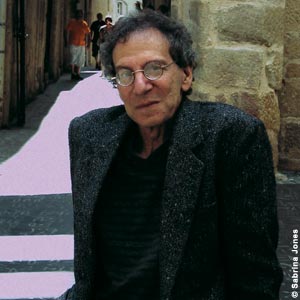Book Review: Steve Stern’s Fabulous “Book of Mischief”
Here is a writer whose vision and generous spirit cannot be ignored. And that Steve Stern writes a prose as fine as anyone could wish must be emphasized, as well.
The Book of Mischief, New and Selected Stories by Steve Stern. Graywolf Press, 367 pages, $26.
By Roberta Silman
 Steve Stern is a wonderful writer whose stories should be more widely read and known, and, hopefully, this New and Selected Stories, a terrific overview of his work, will propel him from the best-kept secret among the Jewish intelligentsia to a writer that people are talking about. Although it is tempting to compare him to Malamud and Philip Roth and even Wallace Markfield and Leonard Michaels and Grace Paley, he really belongs to the older tradition of Yiddish folklore: Sholem Aleichem, I. M. Peretz, and Isaac Bashevis Singer. And although there are echoes of all those writers in his work, he has a unique voice, the most authentic voice of Jewish magical realism that I have yet come across. In his best stories, you feel as if you have entered a Chagall painting and are floating above the rooftops, hovering between this world and a place so mysterious and so pleasant that it might, possibly, be Paradise.
Steve Stern is a wonderful writer whose stories should be more widely read and known, and, hopefully, this New and Selected Stories, a terrific overview of his work, will propel him from the best-kept secret among the Jewish intelligentsia to a writer that people are talking about. Although it is tempting to compare him to Malamud and Philip Roth and even Wallace Markfield and Leonard Michaels and Grace Paley, he really belongs to the older tradition of Yiddish folklore: Sholem Aleichem, I. M. Peretz, and Isaac Bashevis Singer. And although there are echoes of all those writers in his work, he has a unique voice, the most authentic voice of Jewish magical realism that I have yet come across. In his best stories, you feel as if you have entered a Chagall painting and are floating above the rooftops, hovering between this world and a place so mysterious and so pleasant that it might, possibly, be Paradise.
Before getting to his work, though, you have to know a little about his life. Born in 1947 to a Jewish, middle-class family in Memphis, Stern had a usual southern Jewish upbringing, went to college, and then wandered for about a decade—not very different from many of his generation. Unlike many of his peers, though, he returned to his home town and got a job recording the oral histories of older residents of a section of Memphis known as The Pinch—the place where the Jews from Europe (mostly eastern Europe) settled around the turn of the century. He became so enchanted with what these elderly people told him that he decided to give them a voice and in so doing, found his own voice.
For the stories from The Pinch, which make up the first part of this book, are among his very best, written with a wry tenderness, an impeccable ear for dialogue, and an almost leisurely attention to detail that is hard to resist.
My favorite story in this section, and, indeed, in the whole book is “Zelik Rifkin and the Tree of Dreams.” It is the summer of legendary heat sometime at the beginning of the century in Memphis, and Zelik Rifkin, who lives with his widowed mother and their boarder Mr. Notowitz above Silver’s Fruit & Vegetables, begins to sleep in the park at night with all the other inhabitants of The Pinch. And that’s when his life begins to change, his status among his peers grows, and even more important, Zelik discovers a way out of this suffocating neighborhood and this summer’s suffocating heat. Here he is at the beginning:
“It’s me, Mama,” hailed Zelik upon entering the cramped apartment . . . He always announced himself as if the remote Mrs. Rifkin, listlessly pumping the treadle of her sewing machine . . . might mistake him for one of the dead relations she set such a store by, and thus be given a fright. Behind her rose a mound of unstitched jackets and pants like a hill of straw that refused to be spun into gold.
Smiling wanly, more to herself than to her son, Mrs. Rifkin kissed the air next to the cheek that Zelik offered.
“I killed a man this morning,” he confided, secure in the knowledge that she never heard him. “I robbed the Planters Bank and rubbed out a teller.”
“Just so you be careful,” replied his mother, absently feeding fabric to the bobbing needle. “Don’t climb too high, you won’t sink too low. All I ask is that you be careful. Remember, your father, Mr. Avigdor Rifkin, peace on his soul, was struck down in his prime.”
Slowly, because of this extreme heat, which becomes a catalyst for freedom, everyone begins to loosen up and change, and Zelik finds himself in the enviable position of emerging as the neighborhood mensch. Here is an example of Stern at his best, refusing to “get to the point,” as one of his characters might say, and letting the story evolve in the most natural way possible.
Though the summer never relented, the population of the Pinch seemed less oppressed by it than before. Something of the festive mood they displayed in the park at night was now extended to their daylight behavior . . . They became less rigorous in observing their shop hours, taking siestas and making trips to the public baths. Mrs. Bluestein designed a tunic made from twin enema bags filled with ice, which she threatened to have patented when it was copied by the tailor Schloss. Another trend was set by Mr. Shapiro, who strung a hammock between his shop awning and show rack, then hired neighborhood children to fan him with broad-rimmed fedoras. Everyone wore looser, skimpier garments, even pajamas and dressing gowns by day, lending North Main Street the aspect of a Baghdad seraglio. And one and all went out of their way to pay their respects to Zelik Rifkin.
I won’t give away the denoument of this fabulous story, which relies on the ability to soar (a favorite solution for Stern), but I will say that Zelik is as real to me as Pip, and Isabel Archer, and Leonard Bast. What makes these stories so outstanding is that there is never any condescension to the characters, even when Stern is sly, as in the seductive “Romance” from the Lower East Side, New York, or when he starts to introduce demons and dybbuks into their lives, sometimes successfully and sometimes not. Most of the time, you are willing to go where Stern takes you because he has taken the time to study Jewish traditions and roots in the Midrash and Zohar and Kabbala and has used his learning as ballast for his imagination to make plausible the yearnings and failures of these lovable folk.
The most daunting task for a writer of tales like these is how to end each one, but Stern is up to the task. By the time his stories conclude, we are so satisfied by what has happened to his characters that we accept almost anything. And he often winds-up so off-handedly that you can only admire his chutzpah and smile. At the close of “The Sin of Elijah,” which revolves around a couple so physically attuned that Elijah in his voyeurism cannot take his eyes off them, their tragic fate is somehow turned on its head:
For the Fefers had been one of those rare cases where a couple shares two halves of a solitary soul. Theirs had indeed been a marriage made in heaven such as you don’t see much anymore, the kind of match that might lead you to believe God himself had a hand in it—that is, if you didn’t already know He’d gotten out of the matchmaking racket long ago.
Where Stern sometimes does not succeed is when he mines what I call the Sunday school joke repertoire, and he sometimes falls back on this schtick to push the narrative, as in the story that had tremendous potential but doesn’t quite make it: “The Man Who Would Be Kafka” from the Europe section. What is it with these Jewish boys of a certain age who love these silly dirty jokes? I have known them since I was seven years old, first in Brooklyn, and then on Long Island, and the jests were stale then and are stale now. And so are the silly sex scenes that they inspire. But this is a small quibble.
And the truth is, if you want to use these stories in high school or Sunday school, the kids know everything nowadays anyway. What I would hope is that all those Sunday school teachers who were the target of all those spitballs when I was young, and may still be now, will use these stories in their classes. Will read them aloud to their students, to their own children and to their grandchildren. Will press this book into the hands of their gentile friends, who need to understand that there is more to Jewish literature in the twenty-first century than Holocaust tales. And that they will pass them onto their friends teaching in the universities. For here is a writer whose vision and generous spirit cannot be ignored. And that he writes a prose as fine as anyone could wish must be emphasized, as well.
Roberta Silman is the author of Blood Relations, a story collection; three novels, Boundaries, The Dream Dredger, and Beginning the World Again; and a children’s book, Somebody Else’s Child. She writes regularly for The Arts Fuse and can be reached at rsilman@verizon.net.


Dear Roberta, your mouth to God’s ear. My profoundest wish is to be worthy of such a generous and intelligent judgment. A groysn dank, Steve